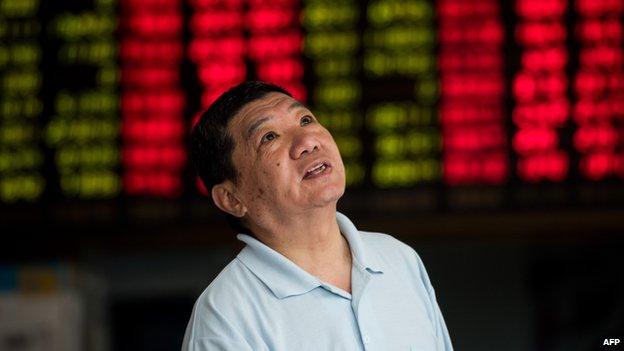Shanghai shares end week almost 8% lower as markets recover
- Published

Chinese shares were looking up in Friday trade
Chinese shares ended the week almost 8% lower after volatile trading that started on Monday with shock losses and spread fear to global markets.
On Friday, the mainland's benchmark Shanghai Composite closed up 4.8% at 3,232 points.
China's second bourse, the Shenzhen Composite, closed up 5.4% to 1,846 points, but ended the week 9.4% lower.
Other stock markets in Asia also continued their rebound, helped by a strong finish for US shares.
Japan's benchmark Nikkei 225 closed up 3% at 19,136 points, but the Hang Seng index in Hong Kong reversed earlier gains to close down 1%.
The Hang Seng ended the week 3.6% lower - its sixth consecutive weekly fall.
Dominic Chan, analyst at GF Securities in Hong Kong, said: "Investor confidence remains shaky. Some took profit as they think the rally is not sustainable."
Angus Nicholson, an IG Markets analyst, said investors remained concerned about China and when the Federal Reserve will raise US interest rates.
European markets were mixed, with London's FTSE 100 and Paris's Cac 40 closing higher, and Frankfurt's Dax ending the day slightly lower. The Dow Jones in the US was almost unchanged on the day, falling 12 points, or 0.1%, to 16,643.01.

Analysis: Andrew Walker, BBC World Service economics correspondent
China's market has rebounded, so sighs of relief all round?
Some argue, it is a typical August market flap, and calm was always going to return when the grown-ups are back from their holidays. Well, maybe.
But this episode is a reminder of how important China is to the global economy and of the fact that it is slowing down.
The rest of us really do need China to achieve a smooth transition to a slower and more sustainable growth rate.
Two figures to underline the need for more moderate growth: the average over the last three decades was 10%, and investment has been more than 45% of national income, or GDP, every year since 2009.
Neither can last indefinitely. The hard bit is getting to a new path without tripping up on the way.
Read more from our experts:

Japan inflation flatlines
The rise in Tokyo extended the previous day's recovery for Asia's largest stock market after its sharp losses earlier this week.
Investors were also digesting new data showing that Japanese inflation fell back to zero in July, raising speculation that the central bank would launch a fresh round of stimulus.
In Sydney, the ASX 200 finished 0.6% higher at 5,263 points.
Marking the end of a week of corporate results, the supermarket Woolworths reported a 12.5% drop in full-year profit - its first fall in almost two decades.
However, Woolworths' shares closed 1.5% higher after the retailer announced a new chief executive in a bid to revive its fortunes.
South Korea's Kospi index finished 1.6% higher at 1,937 points.
The recovery across Asia took its cue partly from China's recovery, but also the strong sentiment from the US.
Shares on Wall Street rose overnight and oil prices jumped sharply after revised figures showed the US economy expanded far more than originally thought in the three months to June.